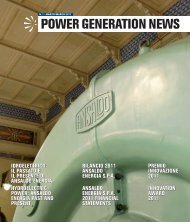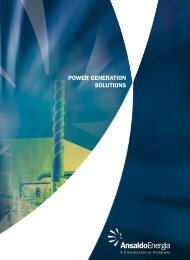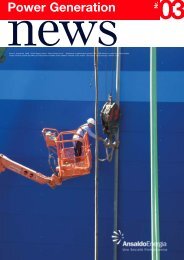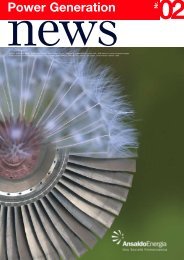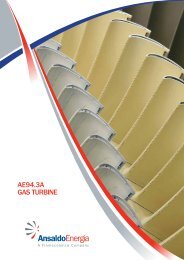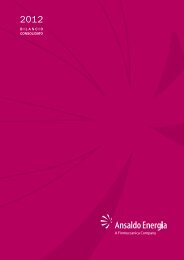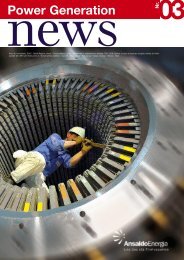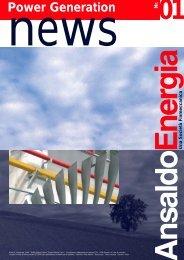ANNUAL REPORT
ANNUAL REPORT
ANNUAL REPORT
You also want an ePaper? Increase the reach of your titles
YUMPU automatically turns print PDFs into web optimized ePapers that Google loves.
ANSALDO ENERGIA FINANCIAL STATEMENTS 2009<br />
29<br />
Market prospects and competitive<br />
positioning<br />
Global performance of the power generation<br />
market and prospects<br />
The global economic recession in 2009, after a<br />
decade of annual growth in excess of 3.5%, has<br />
caused a reduction in global demand for electric<br />
power of about 1.1%.<br />
In Europe this figure is about 5%. Shrinking<br />
revenues, in conjunction with the uncertain<br />
financial situation, have caused most power<br />
producers to revise their investments in new<br />
generating capacity significantly in the short term,<br />
after an impressive 2007-2008.<br />
The global market for power generation<br />
components in 2009 has therefore been estimated<br />
at about 50% of the values in the same period of<br />
the previous year.<br />
This dramatic collapse in demand has affected<br />
almost all types of electric power generation plant,<br />
although the most affected have been those with a<br />
high initial investment and long construction times,<br />
such as coal-fired, hydro-electric and nuclear power<br />
plants, which fell by more than 60%.<br />
So far as concerns gas plants, the drop is in the<br />
order of 45-50%, whereas the wind power industry<br />
has seen orders fall by about 30%.<br />
The solar power market has bucked the trend, with<br />
incentives recently introduced in many countries<br />
driving higher investment volumes.<br />
The current macro-economic context, despite the<br />
fact that various indicators have pointed to the<br />
return of moderate optimism in the last quarter of<br />
2009, suggests that demand will remain weak, at<br />
least in the first half of 2010.<br />
The awaited economic recovery, in conjunction with<br />
the factors that continue to support demand for<br />
electric power, including demographic growth,<br />
improving lifestyles, and the need to renew and<br />
maintain the existing generation fleet, nevertheless<br />
guarantee good prospects in the medium and long<br />
term for the electric power generation plant and<br />
component market, both as regards the big fossil<br />
fuel and nuclear plants, as well as for technologies<br />
that exploit renewable sources and distributed<br />
generation.<br />
The reduced plant usage factor, combined with<br />
strict cost containment policies by energy<br />
operators, have caused a slight slowdown in<br />
service investments too, a sector that is<br />
underpinned by constant growth.<br />
Performance of the thermo-electric sector and<br />
prospects<br />
Globally, demand for thermo-electric power plant<br />
components reported a fall of about 55% in 2009<br />
compared with the same period in 2008.<br />
The market for gas cycles in traditional target<br />
geographical areas for Ansaldo Energia reported a<br />
downturn in demand in line with the global context,<br />
marking a return to 2006 market levels.<br />
Western Europe, where demand held up in the first<br />
few months of 2009 as a result of the<br />
confirmation of several large investments prepared<br />
during 2008, reported a sharp slowdown in the<br />
second half of the year.<br />
The Middle East, supported by a major order in<br />
Iraq, and North Africa are the areas least affected<br />
by the fall in demand, which has however hit areas<br />
like Eastern Europe and Russia hard.<br />
In the gas turbine market in target regions,<br />
Ansaldo Energia market share in 2009 stands at<br />
6%, which is in line with the results delivered in<br />
2007-2008.<br />
Turning to gas turbine technology in the same<br />
geographical areas, General Electric, while halving<br />
the number of machines sold, confirms its position<br />
of market leadership with a share of greater than<br />
40%, while Siemens, thanks to a major order in<br />
Iraq, has seen its share rise to 35% for the first 9<br />
months of 2009, at the expense of Alstom and<br />
more importantly Mitsubishi, which reported a<br />
sharp drop in orders in the same period.<br />
PERFORMANCE




